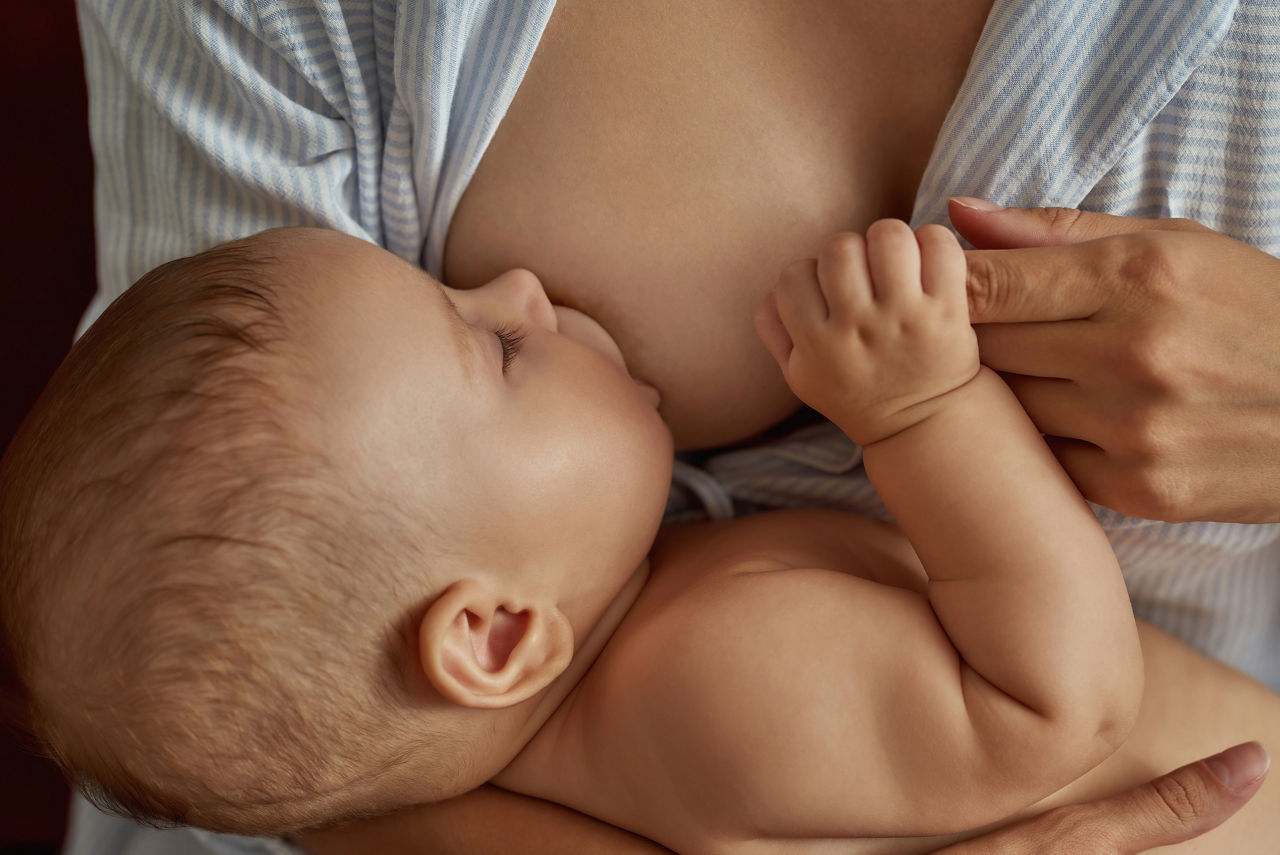This world is a strange and different place for your newborn. Hear from our baby feeding expert, Sue Battersby, on how that amazing first cuddle with your new arrival doesn’t just feel great to you, but impacts their sleep habits, immunity, stress levels and more.
Seven reasons to really treasure your first cuddle

Skin to skin
The incredible impact of close contact
As a new mother, holding your baby close for the first time can be an amazing experience, as you savour the feeling of the new life lying on your tummy. But placing a newborn baby on a mother’s bare skin, a technique known as skin-to-skin contact, is about so much more than giving your child their first cuddle. Skin-to-skin contact can create remarkable health benefits primarily for the baby but also for the mum.1-5
Providing your newborn with comfort and stability
It will come as no surprise that birth and the new environment into which your baby is born are stressful. However, evidence suggests that skin-to-skin contact between a mum and her newborn can change this initial period of uncertainty for the baby into an extremely comforting experience.1
Skin-to-skin helps keep your baby warm (newborn babies have a limited capacity to regulate their own body temperature; skin-to-skin contact can take care of this naturally helping baby maintain a healthy temperature); and allows your baby to hear the comforting sound of your heartbeat, which they will recognise from their time in your uterus. Warmth and hearing your heart beat will help your baby feel comfortable in its strange new world and adapt to its new environment. In addition, skin-to-skin contact promotes physical stability in your child. It can increase glucose levels (reducing hypoglycaemia or low blood sugar); and help to regulate baby’s respiratory rate and blood pressure.2

Skin-to-skin contact encourages early colonisation against infection as the baby’s immune system responds to the bacteria on its mother’s skin.3
Reducing pain and stress
Being comfortable also helps reduce stress levels. In any situation where a baby feels stressed, skin contact can relax them so significantly that their cortisol levels (stress hormones) are reduced.1 This is particularly relevant in the first 2–3 hours following birth, which have been shown to be a sensitive period for the manifestation and control of stress.1 This soothing effect can also help to reduce or ease pain in situations where your baby might feel discomfort such as a difficult birth.1
Promoting your newborn’s health and immunity
Early skin-to-skin contact is important for the development of an infant’s microbiota – the trillions of bacteria and organisms we harbour on our skin and within our respiratory and gastrointestinal tracts. The microbiota of a child begins to develop in the uterus and increasing evidence supports the importance of protecting the transfer and maintenance of the normal microbiota from a pregnant mother to her baby. During, and immediately after, birth bacteria are introduced to a baby’s body and development of the gut is largely a result of the exposure to microbes in the environment.4 Skin-to-skin contact encourages early colonisation against infection as the baby’s immune system responds to the bacteria on its mother’s skin.3 Disrupted microbiota has been linked to a wide range of medical conditions including allergies and asthma.4

Holding your baby on your skin helps support brain development by increasing essential neural pathways, activating areas of the brain which are associated with emotional learning and memory formation.
Developing maternal attachment
Hormones known to influence attachment behaviours are increased by skin-to-skin contact. One such hormone is oxytocin – also dubbed the love hormone – a natural hormone that creates a feeling of relaxation and wellbeing. The feelings generated when this particular hormone is released in the brain lead to an increase in relaxation, attraction, facial recognition and maternal caregiving behaviours2, all of which promote stronger bonds that are beneficial to both mother and baby.
Breastfeeding and milk flow
Incredibly, babies are born with the innate skill and motivation to breastfeed and are able to crawl spontaneously, seek out the breast and self-attach without assistance when placed skintoskin.2 With such contact, the mother and the baby exchange sensory information that stimulates and elicits a wide range of behaviours in the baby such as salivating, mouthing, rooting, crawling to the breast and achieving successful attachment. It also helps that babies can smell colostrum at birth; amniotic fluid has a similar smell to colostrum so baby is drawn to the breast by the familiar smell.
It has been shown that mothers who start skin-to-skin contact immediately after birth, and continue during hospitalisation, have increased breastfeeding rates and duration.1
Brain development and sleep patterns in your newborn
As expected, the brain of a newborn baby is not fully mature; it is only a quarter of the size it will be in adulthood.2 Holding your baby on your skin helps support brain development by increasing essential neural pathways, activating areas of the brain which are associated with emotional learning and memory formation.2 Stroking and gently talking to your baby whilst in skin-to-skin contact will also assist this process.
Establishing sleep patterns in your newborn
Although most new mums will feel that their newborn babies ‘never sleep’, in actual fact in the first few weeks of life babies spend the majority of their life sleeping. They’re just not necessarily sleeping at the right times (i.e. when you’re asleep!). Sleep is essential to brain development and growth in babies, and skin-to-skin contact is thought to be beneficial in improving infant sleep cycles.5
Research shows that babies who experience skin-to-skin contact spend more time in quiet sleep, which is longer and less disturbed, helping to improve sleep patterns.1
Conclusion
Your warm skin can be the first thing your baby feels immediately after birth. Of course a cuddle with mum is a wonderful way to be welcomed into the world, but skin-to-skin contact is so much more, and can be the best way for your baby to adjust to life outside the uterus. But it needn’t stop there as mothers can continue to provide skin-to-skin contact with their baby throughout the newborn period, building on the rewards for both themselves and the baby.
Written by: Dr Sue Battersby PhD
Dr Susan Battersby has a background in nursing and midwifery. She was a lecturer at Sheffield University until becoming an Independent Lecturer/Researcher. She has a Doctorate in Infant Feeding and has researched both breast and formula feeding. She has also written widely on both subjects covering a range of topics. She has belonged to a number of important Infant Feeding Groups including of the NICE Topic Advisory Group for Breastfeeding Peer Support. For many years she also worked as a volunteer breastfeeding peer counsellor.
Related articles

Get in touch with our Careline experts
Our nutritionists and feeding advisors are always on hand to talk about feeding your baby. So if you have a question, just get in touch


